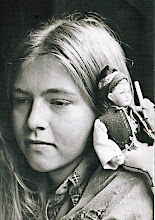 |
| View from the other side |
And then there are the family photos in gardens, a chance for a more casual portrait than might otherwise be acceptable. Here are some photos of my ancestors in their garden in Berlin at the turn of the century. When the city of Berlin was divided into two parts after World War II, this fell on the east German side and my family lost this property. Today there is an apartment building on the site. In the picture below, my great grandmother sits in the chair in front, while my great-great grandmother is on the very left.
Another photo (circa 1906) shows what appears to be a greenhouse, with my great-great grandmother on the left and my great grandmother in the middle. The smiling young boy is my grandfather. He died during World War II, so I never had the chance to meet him. His sister Käthe is on the right.
And then there's this odd photo postcard, not in very good condition, showing my grandfather, the youngest, and his siblings.
Here in Oregon, we love our garden, especially during the warmer months when we can cook and eat outside. We look forward to that season with much anticipation during the rainy winter months. The benefit of all those rainy months is that everything grows vigorously here.
Even things you may not want to grow vigorously. For more on this plant, visit this previous post.
For a veritable worldwide garden tour, head over to Sepia Saturday.



























